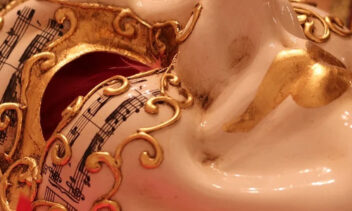Whenever I visit my parents’ house, I always find a few minutes to sneak off and rummage through my childhood bedroom. Childhood bedrooms are filled with all sorts of treasures—old photos, comic books I thought would be more valuable, books I didn’t have room to bring to my current home, basketball cards I also thought would be more valuable … But whenever I’m in my childhood bedroom, I gravitate toward old notebooks. I was and remain a prolific scribbler of ideas. My bedroom has all sorts of notebooks—some that date to elementary school filled with short stories that for some reason switch tenses (first person to third person, past tense to present tense), which serve as a testament to a young child enamored with language who didn’t yet quite know how to write. So why am I sharing all this? During my most recent visit to my parents’ home, I found a notebook—probably from 1999, when I was just beginning ninth grade—grappling with God and Judaism. It’s eerie and sometimes cringe-worthy reading your own teen ruminations about God. I didn’t find anything particularly noteworthy, but I was mostly fascinated that this as a topic has both been an enduring interest as well as a subject I find particularly difficult to discuss.
I have always been captivated by the topic of God, but very likely for a different reason than most. It’s almost hard to explain, but ever since I was a child I always felt hyper-aware of the experience of my own consciousness. Like the very sensation of thinking and being alive was something that I found somewhat strange, like an itchy sweater that you remain aware of as long as you are wearing it. My experiential vantage point always seemed to point to the existence of a higher power. How else, I reasoned, would the sensation of consciousness ever arise? I began reading books about consciousness—starting with Hofstadter’s classic Gödel, Escher Bach: An Eternal Golden Braid about recursive thinking, and then moved on to the works of his student David Chalmers, one of the most pre-eminent scholars of consciousness. I learned that I, of course, was not the first to peer through the sensation of consciousness and consider the reality of a divine power and I also learned that many were fairly dismissive of my approach altogether. But the hard thing about an approach to God grounded in my personal sensation of consciousness is that it becomes quite difficult to explain and quite uncomfortable to discuss. God, for me at least, is so deeply personal that any attempts to share, discuss, or describe are as vexing as it is to transmit my own very personal sensation of being alive.
But I was not alone in grounding so much of my own conception of God—however flawed and difficult to transmit—in my own experiential reality. The philosopher, Professor Alvin Plantinga, proposed something similar—or perhaps adjacent is the better word—with his approach to God known as reformed epistemology. Plantinga is no philosophical slouch: he taught at Notre Dame and Calvin University and is recognized as a major figure in analytic philosophy by both atheists and religious people alike. He’s a name worth becoming familiar with. His basic approach sidesteps the need for classical proofs for God—popular for most of religious history—and instead posits that belief in God can be rational as a proper and basic belief the same way we believe in the existence of other people or the integrity of the reality outside our window (like we’re not in some simulation like The Matrix). This resonated most with me because firstly, it was how I personally cultivated my own understanding of God and, secondly, I have found most “proofs” for God to be somewhat grating, flawed, and very often irritating. That likely says more about the kind of person who offers proofs for God, or anything else for that matter, than the actual substance of the proofs themselves. Still, his approach remains compelling and reflective of my own experiences.
But if God emerges from our self-conception, it’s reasonable to think that just as we mature as individuals, so too our conception of God evolves.
It also in many ways parallels an idea I found in the writings of Rav Tzadok of Lublin (1823-1900) that I am almost hesitant to share. Essentially, Rav Tzadok writes that people need to create God for themselves. I know I am going to misrepresent the idea, so I will tread lightly, but Rav Tzadok integrates one’s personal sense of self with the very existence of God. The passage most are familiar with—if you are familiar with anything he has written—is his statement that just as someone must believe in God, so too they must believe in themselves. Here’s the passage in Hebrew in full:
ר’ צדוק הכהן מלובלין – צדקת הצדיק אות קנד
כשם שצריך אדם להאמין בהשם יתברך כך צריך אחר כך להאמין בעצמו. רצה לומר שיש להשם יתברך עסק עמו ושאיננו פועל בטל שבין לילה וגו’ (יונה ד’ י’) וכחיתו שדה שלאחר מיתתם נאבדו ואינם. רק צריך להאמין כי נפשו ממקור החיים יתברך שמו והשם יתברך מתענג ומשתעשע בה כשעושה רצונו. וזה פירוש (שמות י”ד ל”א) ויאמינו בה’ ובמשה עבדו פירוש משה רצה לומר כלל ששים ריבוא נפשות ישראל בדור ההוא האמינו שהשם יתברך חפץ בהם [וממילא גם כן במשה אשר הוא ממש הם וכמו שאמרו ז”ל (בבא בתרא קכ”א ב) שכל זמן שהיו ישראל נזופים לא נתיחד הדיבור למשה. וכמו שנתבאר במקום אחר כי בכל חטאי ישראל חטא גם כן משה שהוא כללותם כמו בעגל היה חטא משה בשבירת הלוחות ובאמת הוא דבר תמוה וזר מאוד אפילו לקרוע ספר תורה בחמתו ולהשליכה לארץ מכתב יד סופר דעלמא כל שכן הלוחות מכתב ה’. והוא ממש חטא דעגל כמו שאמרו במקום אחר וכשנאמר לו יישר כחך ששברת ידע כי גם בני ישראל כן כמו שאמרו (עבודה זרה ה’ א) בואו ונחזיק טובה לאבותינו וכו’ ובקברות התאוה איתא (במדבר י”א כ”ב) הצאן ובקר ישחט וכן במי מריבה ובמרגלים היה חטאו השליחות כמו שנאמר (שם י”ג ב’ וברש”י) שלח לך לדעתך ואין כאן מקום לבאר כולם] ורוצה ומקבל נחת רוח מן חלק הטוב שבהם:
I’ve written about that before, but that is not the passage I am referring to. Earlier, in the same work he writes as follows (I’m going to bold the Hebrew parts I find most relevant):
ר’ צדוק הכהן מלובלין – צדקת הצדיק אות מא
אנכי קודם ללא יהיה לך כי על ידי ההתבוננות הגמורה באנכי מצד אמונה הברורה בהשם יתברך שהוא מצוי, הוא ניצול מלא יהיה ונשמר מכל מיני הסרות ונזקין כי אמרו ז”ל (תנחומא ויצא ג’) עשה מצוה אחת מוסרין לו מלאך אחד לשמרו. והנה מדה כנגד מדה כל המצוות קיבלו על ידי שליח נמסר מלאך, ואנכי ולא יהיה שמעו מפי הגבורה לכך בשכר אנכי הקדוש ברוך הוא בעצמו שומרו. ובמקום אחר אמרו (זוהר חדש רות ע”ה א) כי ממצוה נברא מלאך ובמצות אנכי נברא כביכול התגלות השגחת הקדוש ברוך הוא בעצמו במוחו ודעתו של זה בריאה ממש יש מאין במוח ולב אטום להיות מצוי אצלו תמיד על ידי אתערותא כחודה של מחט מתתא נפתח אחר כך כפתחו של אולם:
You’ll pardon my hesitation in translating. It’s not because it’s, God forbid, heretical in any way. I just think I’m a poor translator. But Rav Tzadok is essentially saying that individuals have the capacity to create God for themselves. His presence in our life ultimately emerges from our own personal commitment and experiences. And that both resonates with me and makes discussing God all the more difficult.
But if God emerges from our self-conception, it’s reasonable to think that just as we mature as individuals, so too our conception of God evolves. Too often we get stuck in our childhood conceptions of religiosity. If you ever ask a child about love, they will likely answer something to do with getting presents or cookies. I know that’s how my children answer. But as we grow up, our notions of love, commitment, relationships, and dare I say God evolve as well. That doesn’t undermine our youthful conceptions—quite the opposite it situates them as the foundation upon which we build. A child scarred by the trauma of an abusive parent first needs to address the underlying trauma before developing forward. The same is true with our conceptions of God. In order to evolve, delve into, and refine our conception of God, it’s important to open up those childhood notebooks and gaze into our individual pasts and examine the ground on which our current conceptions stand. If we have the courage and capacity to peer into our proverbial childhood notebooks, we too can make edits and, hopefully, on the course of our life journey, add many more pages.








